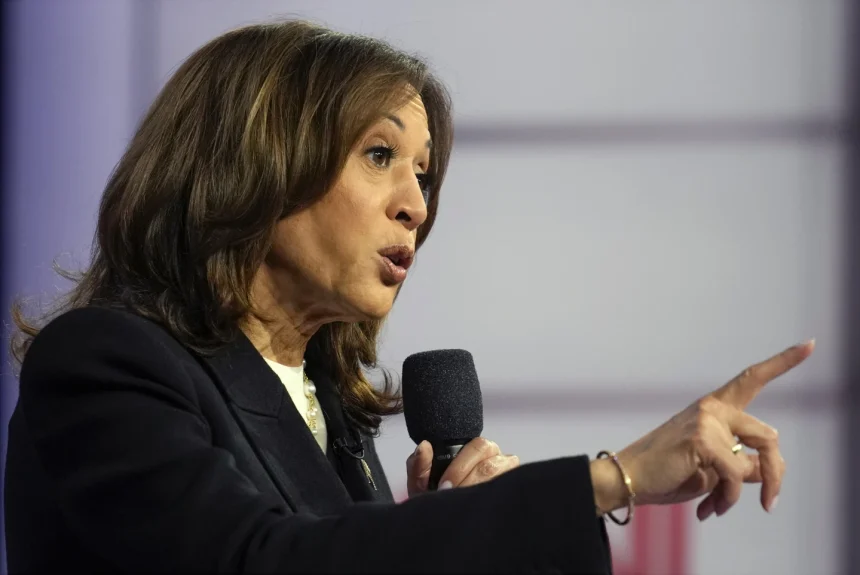Kamala Harris stood in front of the vice-presidential home in Washington, DC on Wednesday afternoon and launched a brief but stinging attack on her Republican presidential opponent, Donald Trump.
The Democratic presidential candidate who noted scathing statements made by Trump’s former White House Chief of Staff, John Kelly, in a New York Times interview, called Donald Trump “increasingly unhinged and unstable”.
The vice president reported Kelly as saying Trump “certainly falls into the general definition of fascists” and has talked approvingly about Hitler on multiple occasions. She stated that her opponent desired “unchecked power” and was later asked directly if she regarded him to be a “fascist” at a CNN town hall event. “Yes, I do,” she answered.
Shortly after the town hall, Trump commented on X and Truth Social that Harris’ comments indicated that she was losing. He described her as “increasingly raising her rhetoric, going so far as to call me Adolf Hitler, and anything else that comes to her warped mind”.
Candidates have a natural inclination to turn negative in the last stages of political campaigns, especially ones as close and hard-fought as the 2024 presidential election. Attacks are more effective in motivating supporters to vote and disrupting opposition efforts.
For Harris, the stronger stance towards Trump contrasts with the more positive, “joyful” language of her campaign’s early days. While Harris warned at the Democratic convention about a Trump presidency without checks and balances, she mostly backed away from President Joe Biden’s central campaign statement that Trump posed an existential threat to American democracy.
According to political strategist Matt Bennett of the centrist Democratic group Third Way, it is evident why Harris was so willing to promote Kelly’s grim portrayal of Trump as a man with authoritarian impulses.
“Everything she does now is tactical,” he explained. “The imperative was to make sure as many voters as possible know about what Kelly said.” The vice president’s new remarks follow her campaign’s multi-week approach of appealing to independent voters and moderate Republicans who may be willing to back the Democratic ticket. Polls indicate that the election is extremely close, with no candidate holding a significant lead in any of the battleground states.
The suburbs surrounding major cities in important battleground states, including as Philadelphia, Detroit, Milwaukee and Phoenix, are filled by college-educated professionals who have generally voted Republican but, according to polls, are sceptical of returning Trump to the White House.
“Her case for how she wins this thing is to create as broad a coalition as possible and bring over disaffected Republicans – people who just don’t feel that they can vote for Trump again,” Bennett told reporters.
Devynn DeVelasco, a 20-year-old independent from Nebraska, is among those who were already persuaded by the long number of senior Republicans who worked for then-President Trump but now say he is unqualified for office. Although she expects that some Republicans would join her in backing Harris, she is concerned that the allegations levelled against the former president have worn thin.
“When the reports [about Kelly’s comments] came out, I wasn’t surprised; it didn’t change much,” Ms DeVelasco told reporters at the BBC.
According to Republican strategist Denise Grace Gitsham, people have heard similar rhetoric about Trump since 2016, so new claims are unlikely to change the dial.
“If you’re voting against Donald Trump because you don’t like his personality, you’re already a decided voter,” she told the British broadcaster. “But if you’re someone who values policies over vibes or personalities, you’ll side with the person you thought you worked best under while they were in the White House.
Both Harris and Trump have sharpened their rhetoric in recent days. During a journey through Midwest battleground states on Monday, Harris again warned of the dangers of a Trump presidency—on abortion rights, she will transfer her focus to Washington, D.C., with a rally apparently scheduled for the National Mall, where Trump spoke before some of his followers attacked the United States Capitol.
On Friday, she will hold a rally in Texas, which she claims best depicts the anti-abortion future if Trump is re-elected. Next Tuesday, she will focus on Washington, DC, with a rally apparently scheduled for the National Mall, where Trump spoke before some of his followers attacked the US Capitol.
Meanwhile, Trump has continued to launch insults on his Democratic adversary. At a North Carolina town hall discussion, he claimed Harris was “lazy” and “stupid” and that her ethnicity and gender were the only reasons she became her party’s nominee.
He also gave his own warning, stating that “we may not have a country anymore” if Harris wins. None of these lines are particularly unusual for Trump, who has spent the majority of his campaign bashing Democrats while adhering to his core agenda on immigration, trade and the economy.
Harris’ final speech, which aims to win over anti-Trump Republicans and independents, is not without risks, according to Democratic strategist Bennett.
“You are always shorting one thing to try to help promote something else.”
According to him, “the candidate’s time and the time spent on advertising are the two most valuable resources. And how you spend those is important.”
Trump has been a polarising presence in American politics for more than eight years. Most Americans have strong, deeply formed beliefs about the man by now. If anti-Trump momentum propels Harris to victory on election day, her recent strategic shift will have paid off. If not, the second-guessing will be rapid and intense.




